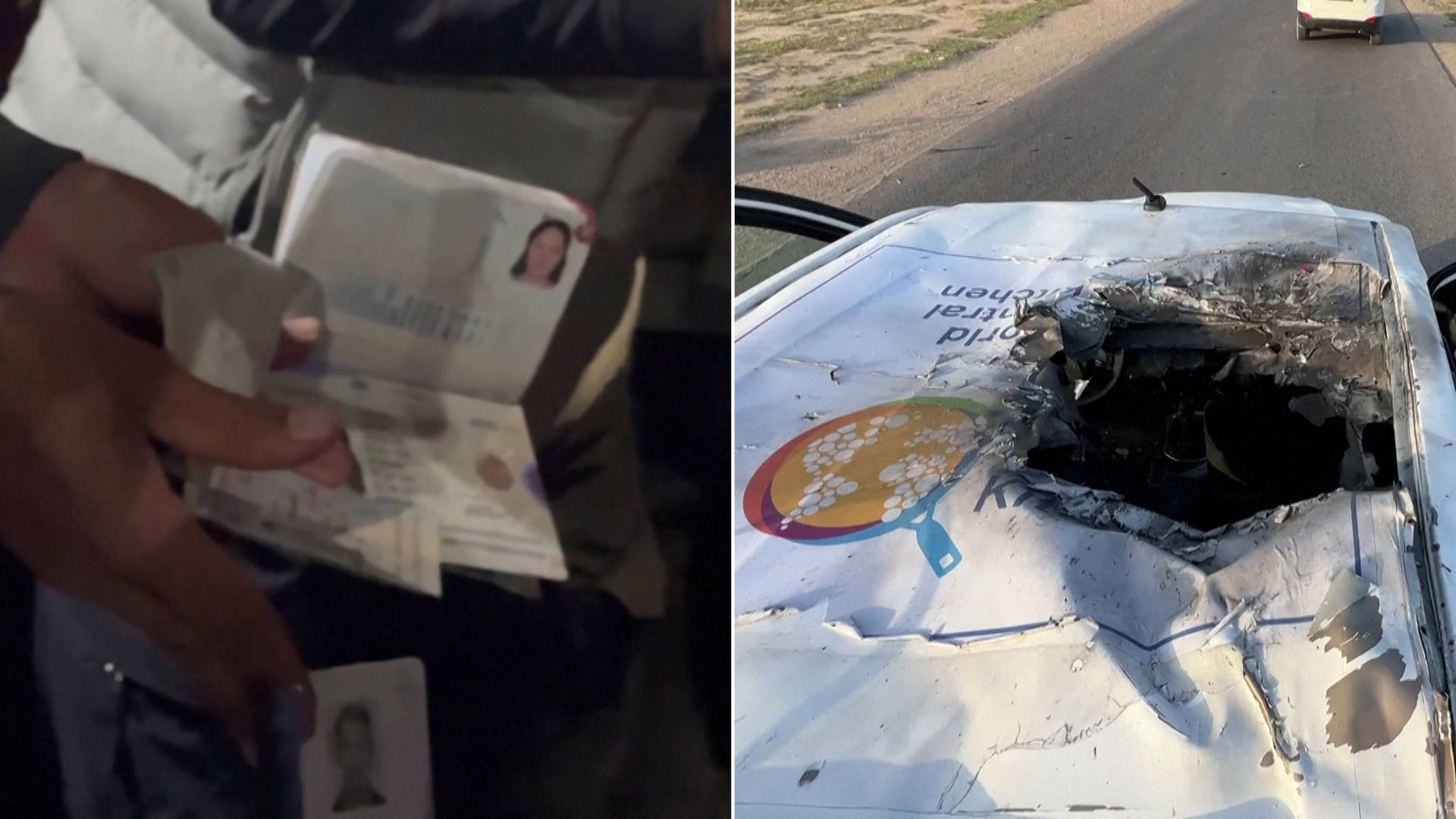This is a rush transcript. Copy may not be in its final form.
AMY GOODMAN: The World Central Kitchen has suspended aid operations in Gaza after an Israeli airstrike killed six international workers from the charity and their Palestinian driver. The aid workers were struck after they left a warehouse in Deir al-Balah where it had unloaded more than 100 tons of food aid that they had brought into Gaza by ship from Cyprus to help avert a looming famine. The aid workers were driving in a clearly marked convoy branded with the charity’s logo. World Central Kitchen said the attack occurred even though the charity had coordinated in advance about the convoy with the Israeli military. The killed aid workers include three British nationals, an Australian, a Polish national and an American-Canadian dual citizen.
Australian Prime Minister Anthony Albanese condemned the attack.
PRIME MINISTER ANTHONY ALBANESE: We certainly have already contacted the Israeli government directly. We are contacting the Israeli ambassador to ask for accountability here. The truth is that this is beyond — beyond any reasonable circumstance, that someone going about providing aid and humanitarian assistance should lose their life. And there were four aid workers, as well as Palestinian driver, in this vehicle. This is a human tragedy that should never have occurred, that is completely unacceptable.
AMY GOODMAN: Earlier today, Israeli Prime Minister Benjamin Netanyahu appeared to acknowledge Israel carried out the attack, saying, quote, “Unfortunately over the last day there was a tragic incident of an unintended strike of our forces on innocent people in the Gaza Strip,” unquote.
The United Nations aid coordinator for the Occupied Palestinian Territory, Jamie McGoldrick, said, quote, “This is not an isolated incident. As of [March 20], at least 196 humanitarians had been killed in the Occupied Palestinian Territory since October 2023. This is nearly three times the death toll recorded in any single conflict in a year,” they said.
We begin today’s show in Rafah, Gaza, where we’re joined by the Gaza-based journalist Akram al-Satarri.
Akram, thanks so much for joining us again. What do you understand took place? Talk about Chef José Andrés’s charity workers who were killed, and their driver, what they were doing.
AKRAM AL-SATARRI: They were helping people. They were trying to secure the food aid for the people in Gaza, whom they were in touch with, whom they were eating with, whom they were in solidarity with, whom they were thinking. They deserved to be treated as humans, and they deserved to be safe, and they deserved to be secured. However, they themselves, the ones who were there extending the helping hand, ended up being killed by an Israeli attack, the circumstances of which are not clear yet, neither to the government of Israel, that apparently ordered the attack, no matter what the circumstances are, nor to the Palestinians who have been seeing at least foreigners there with them extending a helping hand and trying to secure a lifeline while their lives were taken by that Israeli attack.
JUAN GONZÁLEZ: And, Akram, how does this happen, when, reportedly, World Central Kitchen was coordinating its efforts and was informing the Israelis of where its aid workers were?
AKRAM AL-SATARRI: Well, this is the fact that shocked everyone. And as a matter of fact, many other international aid workers and some UNRWA workers also were affected by the ongoing bombardment. UNRWA made a specific statement about the number of UNRWA staff who were killed, which is around 166 UNRWA staff who were killed while they are on job, while they’re moving from their places to their duty stations and when they’re back from their duty stations to their homes or even when they are still conducting their job in their duty station, extending a helping hand to the people.
The coordinates are very well clear for the Israeli army. This is a protocol that has been followed ever since the war has started. Every single humanitarian aid worker that is extending a helping hand in Gaza, that is coordinating or helping or distributing food or doing anything, is already recognized by the Israeli army, and the incident took place. And I think it’s the full responsibility of the Israeli government now to clarify and to provide — to provide justification, and not in the sense that justification of the killing itself, but, rather, demystify the circumstances that led to that catastrophic incident, given that it is not unprecedented, a unprecedented event, where many others lost their lives because of the way Israeli army has been dealing with the general population in Gaza and with the facilities that are supposed to be protected.
As you have just said, the car was marked as a World Central Kitchen car. The staff who are there were already recognized by the Israeli army. And they are very well aware that they’re moving while the Israeli army is aware of their very movement. The coordinates of the warehouse that they were entering and leaving in Deir al-Balah is also well known for the Israelis. The place they were unloading the goods and the food items for the people of Gaza are also well known by the Israeli army. However, the incident took place. And I think it’s upon the Israeli government to explain to the world and to the different countries, including Canada, U.S.A., Poland and also — Poland and, I think, U.K., for how this happened and why this happened.
JUAN GONZÁLEZ: And has there been any improvement in the last week or two of supplies coming into Gaza, especially food and medical supplies?
AKRAM AL-SATARRI: Well, the food and medical supplies are still like very scarce in the Gaza Strip. The different U.N. figures have been voicing their concern over the fact that Israel is limiting all the supplies that are entering Gaza. Even more, Israel is being selective about what enters Gaza and what doesn’t enter Gaza. The Palestinian health system at large sustained a very big blow, a very big strike, when the Al-Shifa Hospital was totally destroyed. It lost 800 beds. It lost 100 dialysis machines. And it also lost one-third of the therapeutic services throughout the Gaza Strip. So, the situation is dire, and it continues to get even worse. And Israel is not willing or is not able to allow more food supplies and medical supplies into the Gaza Strip.
Not far away from us is Abu Yousef al-Najjar Hospital in Rafah. The hospital is suffering because of the fact they have access to very limited supplies. And they have been calling for the international community, they have been calling for the world, they have been calling even for Israel, to allow unhindered access of the medical supplies and food supplies to help the people. They have a place for the people with dialysis, that need dialysis machines and whose people need — have some nutritional need, and those needs are not met. And if the situation continues the way it is, even the urgent and immediate medical needs of those people are not going to be met, which compromises their whole life.
AMY GOODMAN: I want to talk about this in the context of the looming famine, hundreds of thousands of Palestinians pushed to the brink of famine right now. AP is reporting Cyprus, which has played a key role in trying to establish a sea route to bring food into the territory, said ships that recently arrived were turning back with some 240 tons of undelivered aid. The World [Central] Kitchen, Chef José Andrés’s food charity, was the first to get massive amount of food into Gaza, and now we see what has happened to them. I’m wondering, Akram, are you hungry? Is your family hungry?
AKRAM AL-SATARRI: This is a very critical question. For you to understand, I am a Gazan. Gazan means I am living the very same circumstances that my people are living. Sometimes we — it’s Ramadan time, and sometimes we eat one meal a day. Sometimes the meal is not as decent as you imagine for someone who’s fasting for around 16 hours. This is the situation for most of the people in the Gaza.
But to make a difference, people in the south of Gaza are living a little bit better life than the ones who are living in the northern Gaza. The World Central Bank organized that trip with an intention of delivering the 200 tons of food that were delivered initially in the very first pilot trip to Gaza north and Gaza City, where 700,000 Palestinians are besieged and are denied any access whatsoever, except for very limited quantities since one month and a half up to this particular moment. Now the 1,000 tons that were allowed into — the 200 tons and the 1,000 tons were not allowed into Gaza north and Gaza City, where 700,000 people are waiting for the food.
The famine is not looming. The famine is already taking place. We have around 34 Palestinians, adult and young, who died from the starvation. We have many more people who are complaining about the significant loss of their weight. We have people and children who are eager to eat anything whatsoever. Anything whatsoever. People in the north ate the grass, ate whatever they can eat. They eat also the animal Feed. They are sorting it out. They’re cleaining it. They’re grinding it. They’re making bread out of it. And even when the taste and the smell is not what you expect as a human, they still have to eat it, because they don’t have any other option. That situation continues to be very dire, and that situation continues to deteriorate.
Now some people organized and formed some special committees for the sake of just receiving the food that is allowed, the minimum food that is allowed, from the road between Rafah, Khan Younis and Gaza, Salah al-Din Road, and those people ended up being targeted. Seventy of them were killed. And more than 500 Palestinians were killed in different incidents targeting the people around al-Kuwait Roundabout and al-Nabulsi Roundabout when they’re waiting for the food, when they’re waiting for to eat — 20 different incidents of targeting that took the life of 500 Palestinians and 70 of those who are working to organize everything. The way that is now done — the way that this targeting is done indicates that Israel is willing to deprive those people from any hope and any life whatsoever.
AMY GOODMAN: I wanted to ask you about the Israeli prime minister saying he will ban the award-winning TV network Al Jazeera, this after the Israeli lawmakers, the Knesset, passed a bill allowing for the temporary banning of foreign broadcasters deemed to be a national security threat. Of course, Al Jazeera is the most widely viewed network in the Arab world, one of the few outlets to have reporters inside Gaza, the way the Arab world sees what’s happening in Gaza, and, through Al Jazeera English, the way the rest of the world sees, as well. Your thoughts on what this means? I should also add a number of Al Jazeera reporters have been killed.
AKRAM AL-SATARRI: Yes, the issue is that even the Knesset gave that law the name of “Al Jazeera law,” Al Jazeera law, which means that this is an exclusive decision that has been taken for the sake of stopping Al Jazeera from covering, on the grounds of accusation that Al Jazeera is compromising and threatening the Israeli national security. Al Jazeera has reporters inside Palestine, in Gaza Strip, and inside the Israeli territory, and they have been covering the news about the situation.
And I think it is the way they have been doing things that provoked the Israeli Knesset members and the Israeli government, because, number one, the military ground is not — the military ground operation is not going the way they want it to go on, and it’s now the sixth month that they have been facing significant obstacles achieving what they have been achieved. They have warned the Palestinians of an imminent transfer into the Egyptian side. They have been conducting some of the incidents that were described as genocidal behavior by the experts. And some of the footage that was provided by Al Jazeera was used also by South Africa when South Africa was wording and filing and providing the evidences about the ongoing situation in Gaza Strip. And that’s why now Israel is defining Al Jazeera as an enemy and is trying also to chase any other news outlets that might be thinking of providing as comprehensive coverage as the one that Al Jazeera is providing and which is so recognized by the global community and by the people in Palestine and different areas of the Middle East.
So, they are trying to stop Al Jazeera, but I don’t think that they have the power. And when I say “the power,” because now we are shifting. When it comes to the media, we have the media of the citizen, we have the social media, and we have many different platforms. The performance that was conducted by Al Jazeera, I don’t think is going to be stopped by any plan that Israel develops. The only issue and problem for Israel is that now when they are developing and accepting that law, they are making themselves a mockery, because there is no way to stop any voice from saying what they think is right, as long as we have all the alternative media, we have the social media, and we have the citizens’ media. And I think they will continue doing what they can do from Gaza, and sometimes they would have alternative sources from inside Israel, and they will continue their message, and they will continue their mission.
AMY GOODMAN: Well, Akram al-Satarri, we want to thank you for being with us, speaking to us from Rafah in Gaza.
And we have this latest news from the Israeli newspaper Haaretz. It’s just reported new details about the deadly strike on Chef Andrés’s World Central Kitchen aid workers. The newspaper writes, quote, “At some point, when the convoy was driving along the approved route, the war room of the unit responsible for security of the route ordered the drone operators to attack one of the cars with a missile. Some of the passengers were seen leaving the car after it was hit and switching to one of the other two cars. They continued to drive and even notified the people responsible that they were attacked, but, seconds later, another missile hit their car. The third car in the convoy approached, and the passengers began to transfer to it the wounded who had survived the second strike — in order to get them out of danger. But then a third missile struck them. All seven World Central Kitchen volunteers were killed in the strike.” That, again, Haaretz reporting the Israeli military ordered the drone strikes, mistakenly thinking a member of Hamas was part of the aid convoy.
When we come back, the Biden administration continues to send a massive amount of arms to Israel, including 1,800 2,000-pound bombs that are strong enough to level city blocks. We’ll speak to former State Department official Josh Paul and a U.S. soldier who’s refusing to remain silent. Stay with us.











Post comments (0)